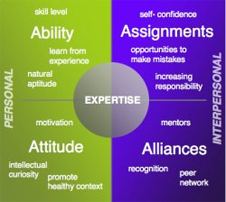June 27, 2008 Vol. 1, Issue 5
When it comes to specialized expertise, NASA is an embarrassment of riches. Our mission enables us to attract and develop leading practitioners in a wide variety of disciplines ranging from robotics to space medicine. So how does one become an expert?
In the spring of 2007, the Academy of Program/Project & Engineering Leadership asked 70 expert practitioners at its fourteenth Masters Forum to answer the question, “How do you learn and develop the expertise you need to do your job?” We were so interested by the data from that session that we repeated the activity with roughly the same number of practitioners at Masters Forum 16 in April 2008. The composite data we’ve gathered so far have enabled us to draw some preliminary conclusions about what it takes to acquire expertise.
From a professional development standpoint, there’s clearly no sure-fire recipe for turning out experts. At the same time, there are four common elements of expertise, some of which can be facilitated or cultivated by an organization. All of these elements require personal responsibility.

Ability is a combination of natural aptitude, skill level (which increases with practice), and the capability to assimilate new knowledge and learn from experience. While innate talent is certainly a part of the equation — very few people possess the right attributes to become concert pianists or Olympic athletes — skill development through continuous improvement and learning is a critical element of ability.
Attitude is closely related to the development of ability. It’s impossible to become an expert without motivation. Intellectual curiosity plays a large part in this: experts never stop asking questions and always want to know more. They possess a relentless focus and a passion for their subject that drives them to work hard for the sake of learning more about their subject area. This passion translates into going beyond what is expected to ensure success.
Assignments are the core learning experiences that lead to the development of expertise. When aligned properly with an individual’s career level, assignments represent opportunities to develop specialized knowledge, learn from mistakes, build self-confidence, and take on increasing responsibility. Assignments move in two directions: experts seek assignments that will enable them to pursue their areas of interest, and assignments in turn “seek” experts for their specialized knowledge. A common attribute of expertise is being assigned challenging work that is meaningful to the organization. The work assignment is the proving ground for expertise.
Alliances are relationships that enable an individual to succeed within an organization. Mentors and peers are critical for exchanging ideas and sharing experiences. Professional networks and recognition by superiors can open doors for assignments. Experts create alliances as they progress through their careers, and their expertise in turn becomes a magnet for others seeking alliances. Being perceived as a good person to work with is critical to the successful cultivation of alliances.
Ability and attitude are intrinsically personal qualities — nobody can give another person a better attitude or a greater ability to do a job. Alliances and assignments, on the other hand, are interpersonal by definition. In an organization like NASA, both dimensions (personal and interpersonal) are necessary to develop true expertise, though the balance differs for each individual and area of expertise.
The Academy promotes the cultivation of expertise in NASA’s workforce in four primary ways:
- It offers in-depth courses with subject matter experts in areas ranging from Mars mission design to space system verification and validation.
- It provides direct team support with leading expert practitioners, mentors, and coaches.
- It facilitates knowledge sharing among experts through conferences such as the Masters Forums and publications such as ASK Magazine and case studies.
- It promotes and facilitates connections with academia, industry, and professional associations that connect NASA with outside experts and provide opportunities for our workforce to benefit from the experience of others.
In short, experts are made, not born. NASA’s success at executing its mission will depend on its ongoing ability to recruit, retain, and develop experts in the dozens of disciplines that it takes to run a space agency. The Academy is committed to promoting technical workforce excellence, and it will continue to seek new ways to help NASA develop the expertise it needs to attain mission success. Our research in this area is ongoing, and as we learn more we plan to communicate our findings through future articles and presentations.





